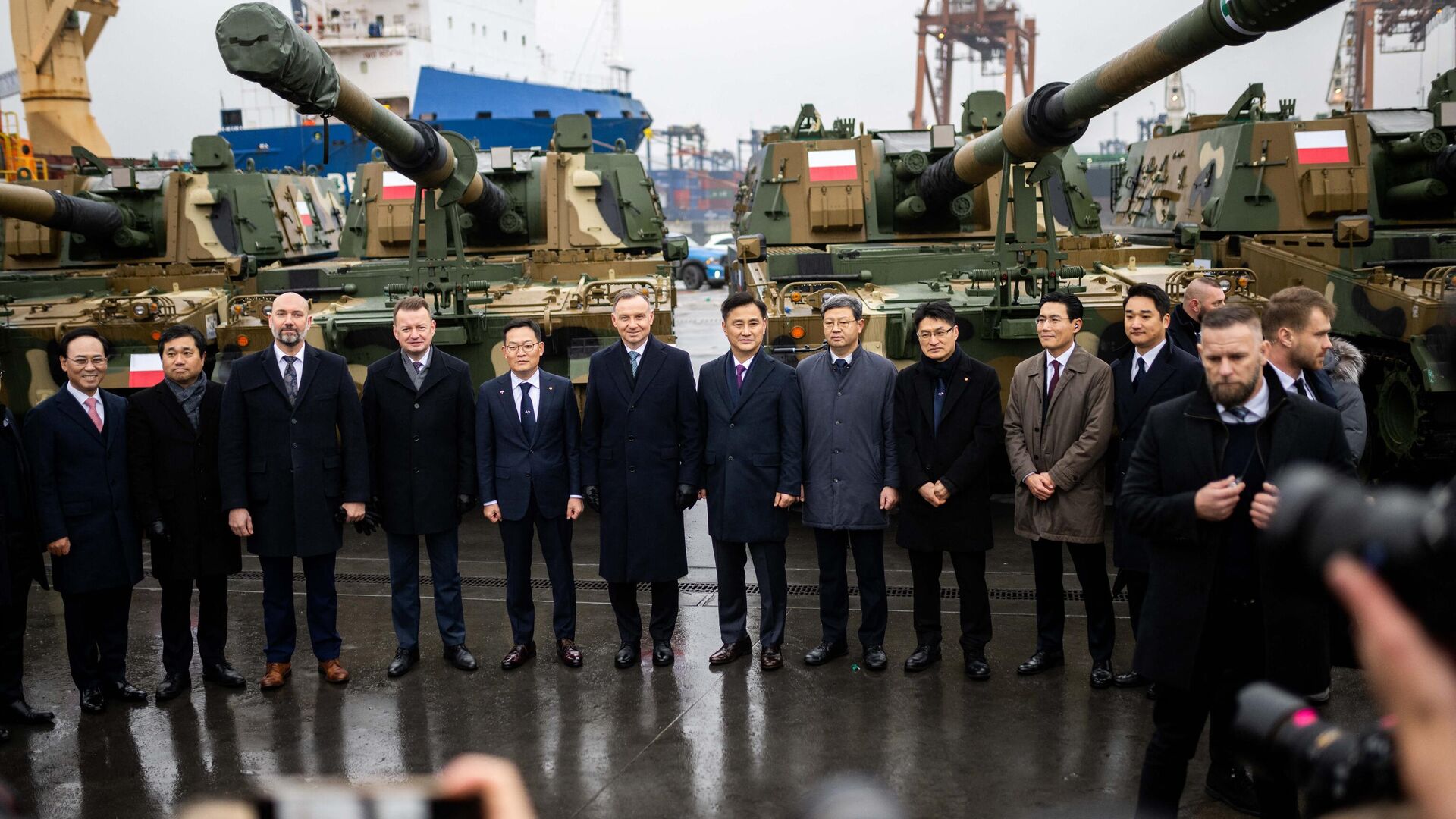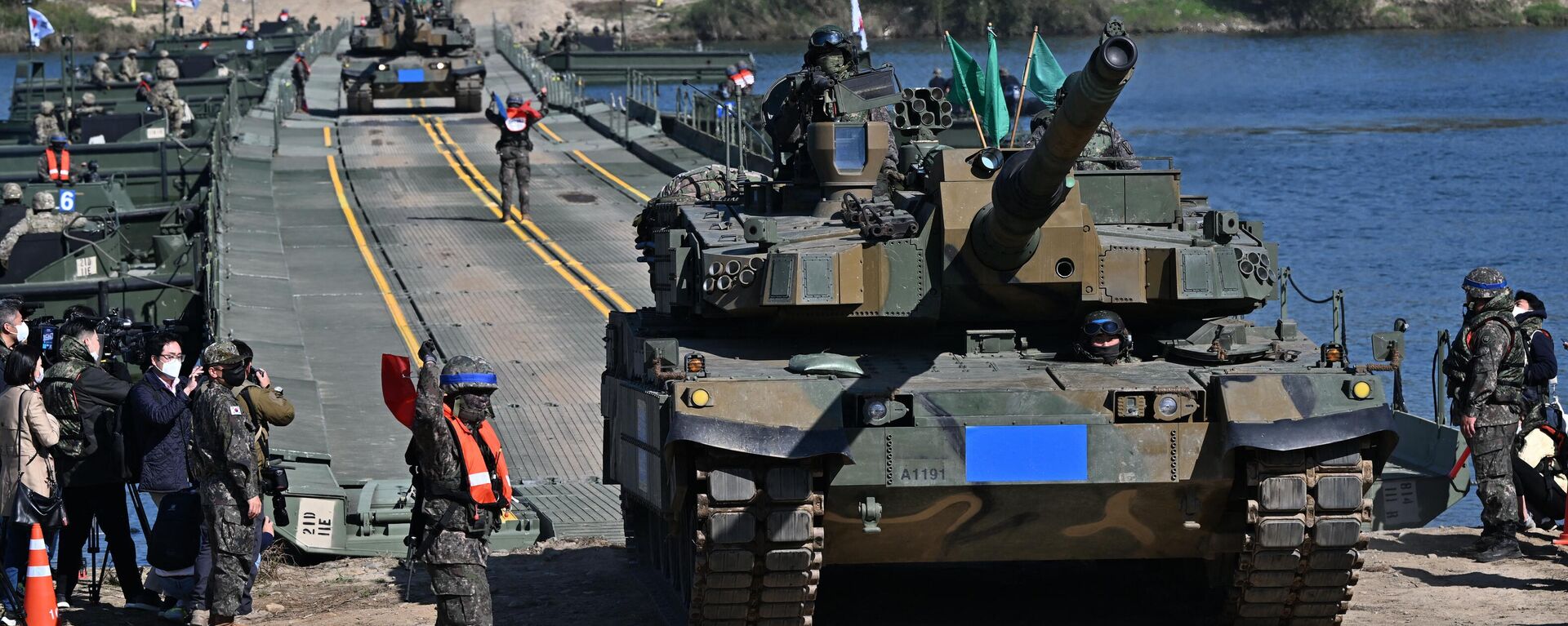https://sputnikglobe.com/20240210/poland-south-korea-rethink-22-bln-arms-deal-amid-fear-of-sparking-regional-wars-1116717221.html
Poland, South Korea Rethink $22 Bln Arms Deal Amid Fear of Sparking Regional Wars
Poland, South Korea Rethink $22 Bln Arms Deal Amid Fear of Sparking Regional Wars
Sputnik International
Warsaw is debating whether to proceed with the acquisition of billions of dollars-worth of additional South Korean military hardware amid questions over the terms of a loan. The deadlock may be just the thing both countries need to avoid a further escalation of tensions in Eastern Europe and the Korean Peninsula, a geopolitical observer says.
2024-02-10T18:30+0000
2024-02-10T18:30+0000
2024-02-10T18:30+0000
analysis
donald tusk
wladyslaw kosiniak-kamysz
military & intelligence
mariusz blaszczak
poland
warsaw
south korea
nato
hyundai
https://cdn1.img.sputnikglobe.com/img/07e8/02/0a/1116716674_0:160:3072:1888_1920x0_80_0_0_792632721f03c0166249f357f0c31091.jpg
A major arms sales deal between Poland and South Korea is on the rocks amid questions by Warsaw about financing.Deliveries of some $22.5 billion of advanced South Korean military hardware ordered by Poland in 2022 and 2023 began last year, but may now hinge on South Korean lawmakers’ willingness to amend legislation to increase the state-run Export-Import Bank of Korea’s lending cap, after just over $1 billion in government-subsidized loans has been left available to Warsaw in 2024.Polish Prime Minister Donald Tusk announced in January that there was a “problem” with the loan conditions. “I do not know who misled whom, whether it was [former Defense Minister Mariusz] Blaszczak or whether the Koreans have pulled out. In the end, it turned out that there was a misunderstanding, but I don’t want to put the blame on anyone,” Tusk said.Blaszczak dismissed the criticism, accusing Tusk of “looking for savings” and “preparing soldiers and public opinion for withdrawals from weapon contracts.”Deputy Defense Minister Pawel Bejda assured that the Tusk the government isn’t seeking a “revolution” in defense priorities, but does want to ensure that “at least 50 percent of armament spending stays at Polish plants” amid the proposed lavish spending on South Korean equipment. The new government is auditing defense purchases, including sources and methods of financing.South Korean lawmakers are sensitive about raising state lenders’ lending limits amid political jockeying ahead of highly-charged general elections scheduled to be held in April, in part due to concerns about the feasibility and desirability of concentrating the Asian nation’s defense exports so heavily in one country.Poland is in the midst of its largest rearmament program since the Cold War, with the 2024 defense budget reaching $29.6 billion, or 3.1 percent of the country’s GDP. The rearmament campaign was kicked off in 2022 by now former Prime Minister Mateusz Morawiecki and the Law and Justice Party, one of the US’s closest allies in NATO’s proxy war in Ukraine.Warsaw has already taken delivery of about 28 of 1,000 K2 and K2PL Black Panther tanks ordered from Hyundai Rotem, about 66 of over 300 Thunder howitzers being purchased from Hanwha Aerospace, and at least 12 of 48 fighters manufactured by Korea Aerospace Industries, but the fate of further sales has been jeopardized over the loan disagreement.Mutual Desire to Avoid Escalation“In the case of Poland’s rearmament, the situation is also very slippery due to the fact that Russian-Polish relations have deteriorated significantly in recent years,” the observer noted, pointing to concerns in both Moscow and Minsk that Warsaw could play a greater role in the Ukrainian crisis, up to and including the possible annexation of western Ukrainian territories.If that happened, South Korea would find itself an unwitting “accomplice,” thus “significantly complicating the relationship between Moscow and Seoul, which Seoul understands. In a situation where Warsaw is already casting doubt on agreements that have been concluded, Seoul is trying to reconsider the expediency of the arms sale, notwithstanding its multi-billion dollar value. Presently, we’re seeing a new round of tensions on the Korean Peninsula, and for South Korea it’s very important that military cooperation between Russia and the DPRK is not intensified,” Kolchin stressed.Lesser of Two Evils?On top of that is Tusk and his Civic Platform government’s greater focus on domestic affairs than its Law and Order predecessors, who saw rearmament and saber-rattling with Moscow a matter of national security and pride.
https://sputnikglobe.com/20240206/ex-polish-commando-russia-dominates-as-to-how-far-ukraine-can-act-1116616048.html
https://sputnikglobe.com/20230926/what-kinds-of-weapons-does-south-korea-produce-and-export-1113695688.html
https://sputnikglobe.com/20230924/how-is-poland-aiding-ukraine-1113627501.html
https://sputnikglobe.com/20230529/south-korea-races-to-feed-europes-insatiable-hunger-for-weapons--1110765482.html
poland
warsaw
south korea
Sputnik International
feedback@sputniknews.com
+74956456601
MIA „Rossiya Segodnya“
2024
News
en_EN
Sputnik International
feedback@sputniknews.com
+74956456601
MIA „Rossiya Segodnya“
Sputnik International
feedback@sputniknews.com
+74956456601
MIA „Rossiya Segodnya“
will polish-korean defense deal collapse, why is poland buying south korean weapons
will polish-korean defense deal collapse, why is poland buying south korean weapons
Poland, South Korea Rethink $22 Bln Arms Deal Amid Fear of Sparking Regional Wars
Warsaw is debating whether to proceed with the acquisition of billions of dollars-worth of additional South Korean military hardware amid questions over the terms of a loan. The deadlock may be just the thing both countries need to avoid a further escalation of tensions in Eastern Europe and the Korean Peninsula, a geopolitical observer says.
A major arms sales deal between Poland and South Korea is on the rocks amid questions by Warsaw about financing.
“The offer that was, in part, presented by the Koreans for co-financing or crediting [arms purchases by Poland] is unacceptable,” Polish Defense Minister Wladyslaw Kosiniak-Kamysz told Polish radio this week, referring to proposals by the South Korean government that Warsaw take out a syndicated loan underwritten by five major South Korean commercial banks after state-backed financing hit its lending cap.
Deliveries of some $22.5 billion of advanced South Korean military hardware ordered by Poland in 2022 and 2023 began last year, but may now hinge on South Korean lawmakers’ willingness to amend legislation to increase the state-run Export-Import Bank of Korea’s lending cap, after just over $1 billion in government-subsidized loans has been left available to Warsaw in 2024.
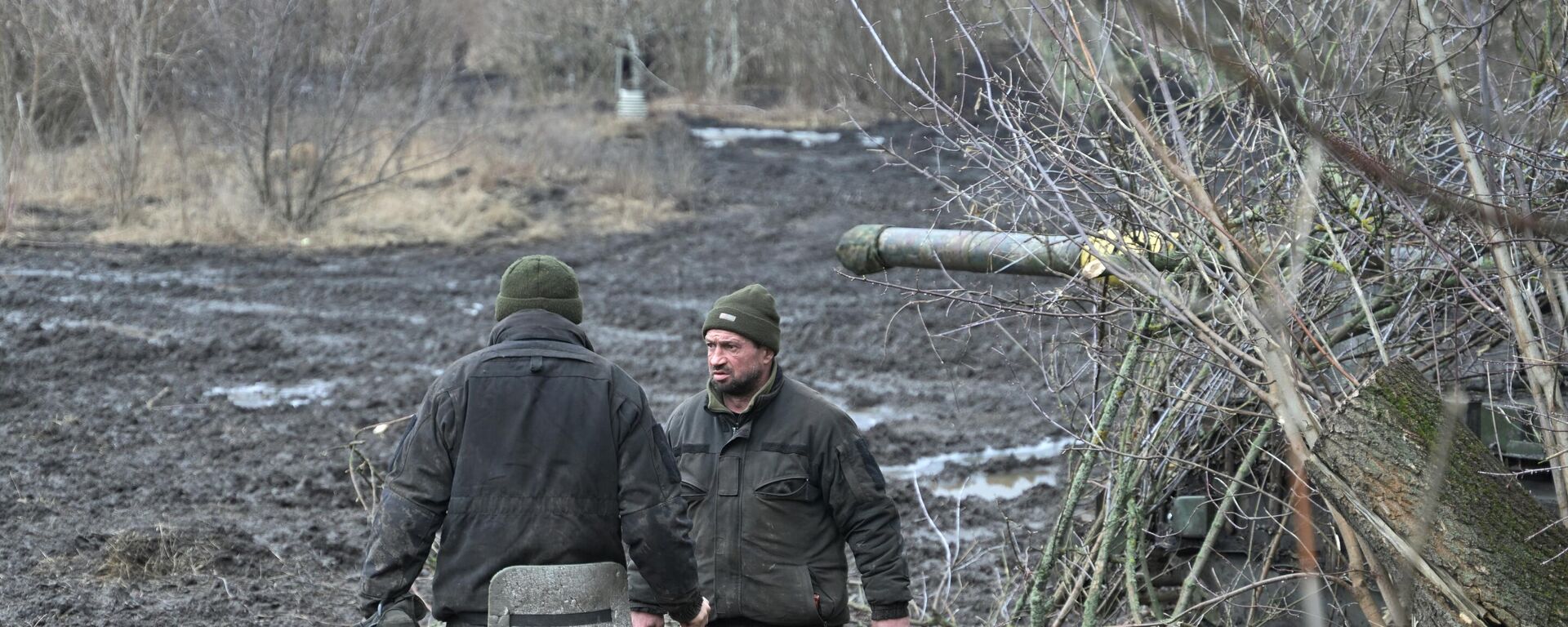
6 February 2024, 07:25 GMT
Polish Prime Minister Donald Tusk announced in January that there was a “problem” with the loan conditions. “I do not know who misled whom, whether it was [former Defense Minister Mariusz] Blaszczak or whether the Koreans have pulled out. In the end, it turned out that there was a misunderstanding, but I don’t want to put the blame on anyone,” Tusk said.
Blaszczak dismissed the criticism, accusing Tusk of “looking for savings” and “preparing soldiers and public opinion for withdrawals from weapon contracts.”
Deputy Defense Minister Pawel Bejda
assured that the Tusk the government isn’t seeking a “revolution” in defense priorities, but does want to ensure that “at least 50 percent of armament spending stays at Polish plants” amid the proposed lavish spending on South Korean equipment. The new government is auditing defense purchases, including sources and methods of financing.
South Korean lawmakers are sensitive about raising state lenders’ lending limits amid political jockeying ahead of highly-charged general elections scheduled to be held in April, in part due to concerns about the feasibility and desirability of concentrating the Asian nation’s defense exports so heavily in one country.
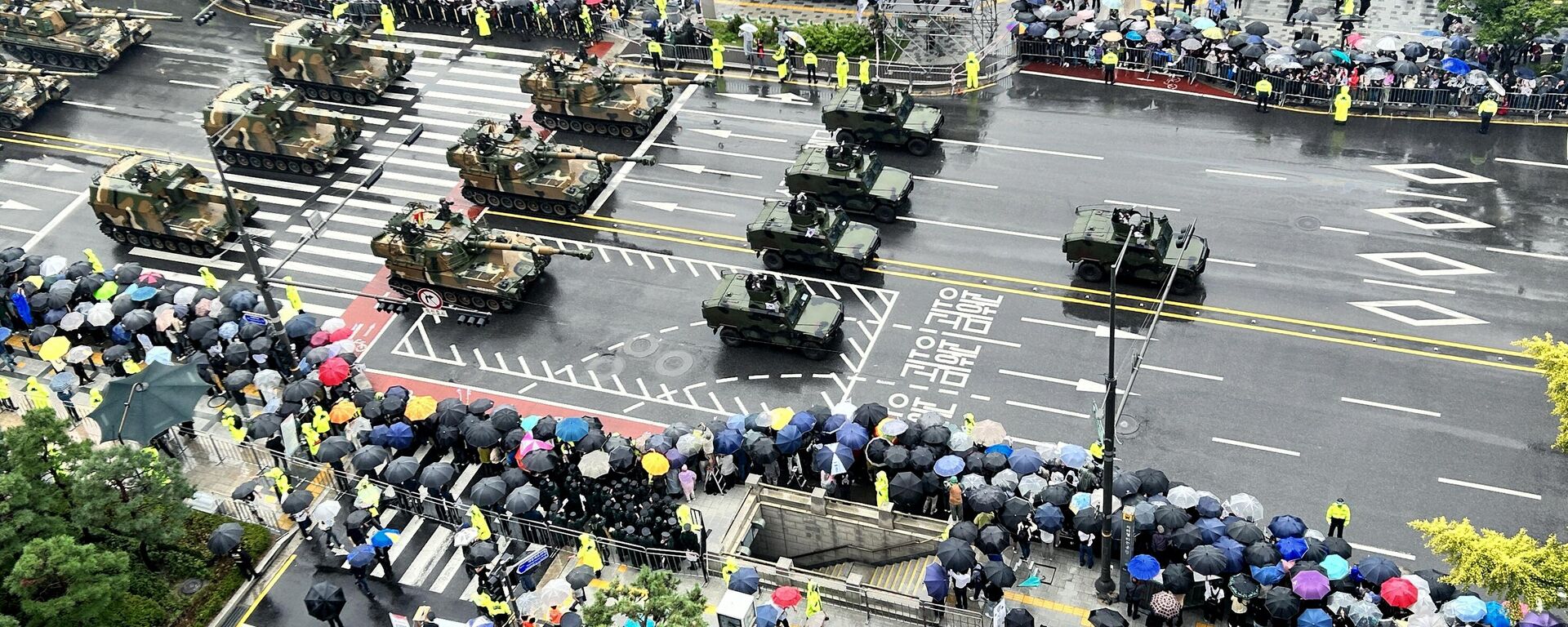
26 September 2023, 17:51 GMT
Poland is in the midst of its largest rearmament program since the Cold War, with the 2024 defense budget reaching $29.6 billion, or 3.1 percent of the country’s GDP. The rearmament campaign was kicked off in 2022 by now former Prime Minister Mateusz Morawiecki and the Law and Justice Party, one of the US’s closest allies in NATO’s proxy war in Ukraine.
Warsaw has already taken delivery of about 28 of 1,000 K2 and K2PL Black Panther tanks ordered from Hyundai Rotem, about 66 of over 300 Thunder howitzers being purchased from Hanwha Aerospace, and at least 12 of 48 fighters manufactured by Korea Aerospace Industries, but the fate of further sales has been jeopardized over the loan disagreement.
Mutual Desire to Avoid Escalation
“South Korea is trying to behave in a very careful manner in relation to affairs in Eastern Europe in connection with the factor of the special military operation” in Ukraine, Russian political analyst Peter Kolchin told Sputnik. “Seoul refused to supply weapons to Ukraine, but did allow the purchase of ammunition for the Ukrainian Armed Forces,” he recalled.
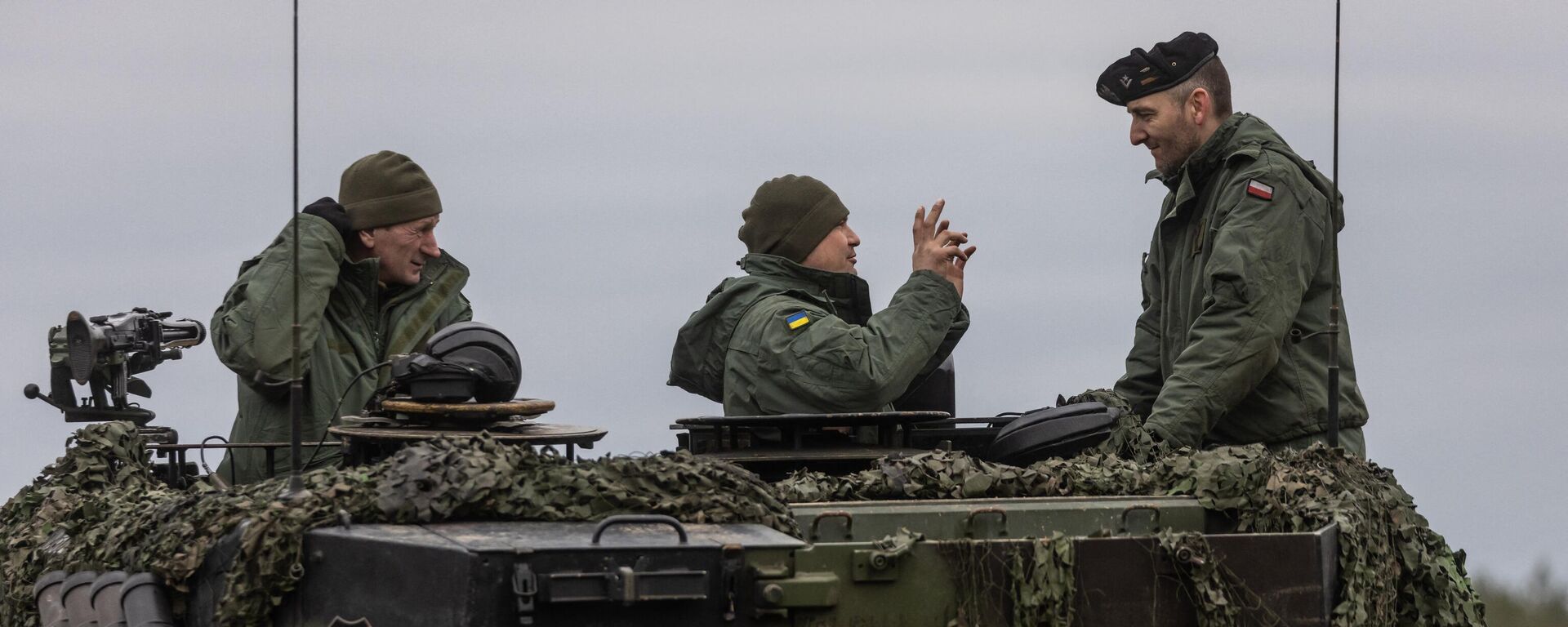
24 September 2023, 14:20 GMT
“In the case of Poland’s rearmament, the situation is also very slippery due to the fact that Russian-Polish relations have deteriorated significantly in recent years,” the observer noted, pointing to concerns in both Moscow and Minsk that Warsaw could play a greater role in the Ukrainian crisis, up to and including the possible annexation of western Ukrainian territories.
If that happened, South Korea would find itself an unwitting “accomplice,” thus “significantly complicating the relationship between Moscow and Seoul, which Seoul understands. In a situation where Warsaw is already casting doubt on agreements that have been concluded, Seoul is trying to reconsider the expediency of the arms sale, notwithstanding its multi-billion dollar value. Presently, we’re seeing a new round of tensions on the Korean Peninsula, and for South Korea it’s very important that military cooperation between Russia and the DPRK is not intensified,” Kolchin stressed.
“Russia has many of the latest military technologies without analogue in the world, and if the DPRK receives the opportunity to develop at least some of them, of course this would be a threat to South Korea. Therefore, it’s quite possible that, given that both parties doubt the feasibility of the contract, it can either be altered or, in principle, terminated,” the observer believes.
On top of that is Tusk and his Civic Platform government’s greater focus on domestic affairs than its Law and Order predecessors, who saw rearmament and saber-rattling with Moscow a matter of national security and pride.
“We can see that the slightly less militaristic Tusk government is trying to be more careful about the issue of rearmament and more concerned with internal issues,” Kolchin said. Tusk “won’t fall behind the pan-European course” vis-à-vis Moscow, “but nevertheless will not become one of the main mouthpieces of Russophobic propaganda, as was the case with the Law and Justice government, whose officials incited anti-Russian relations throughout Europe,” the observer noted.
Poland turned to South Korea for its rearmament in 2022 for reasons ranging from their perceived quality and compatibility with NATO systems, to plans to 'donate' its outdated equipment to Kiev, to the realization that US and other NATO country defense industries might prove too busy churning out weapons for Kiev to focus on Poland's plans. The country's own industrial base has waned significantly since the 1980, when the Polish Armed Forces were considered among the most powerful in the Warsaw Pact, and its armor production capabilities rivaled only by the USSR and Czechoslovakia.
